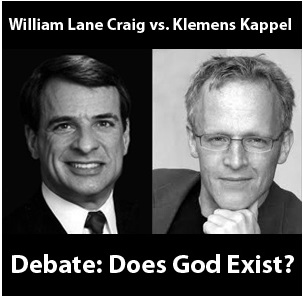 In the debate between Craig vs. Kappel on the topic “Does God Exist” the question “Why should we believe atheism is true?” comes up.Kappel is unable to explain why anyone should believe in atheism while Craig provides 6 reasons right off the bat while theism is true. |
||||
In a debate held April 18, 2012 in Copenhagen, Christian apologist and philosopher William Lane Craig debated atheist philosopher Klemens Kappel on the topic: “Does God Exist?” I couldn’t resist posting this clip – for a number of reasons, namely: A. Dr. Craig concludes Theism or “the God hypothesis” as he put it earlier – is “perfectly rational to hold to” – which is of course the theme of this site. B. Dr. Craig Lists the explanatory power of Theism over atheism, Theism can explain things such as:
(All good topics I should discuss one day.) C. In challenging Dr. Kappel to prove atheism is true, Dr. Craig points out a number of ways one can logically or rationally establish an argument, namely by:
When you watch, notice two things:
Now without further ado, the video:
Duane Caldwell | posted 4-30-2014 | print format |
||||
| 1 The posts mentioning an inference to the best explanation are:The Poor Marksmenship of Evolutionists andReclaiming the Intellectual and Moral High Ground |
Category Archives: Faith
Time to End the In House Debate
 Among Christians there should be no questions or debates about the origins of life, the earth or the universe. |
||||
|
– How important is this for Christians to deal with? Dr. Danny Faulkner, Author, Distinguished Professor Emeritus, retired and now on staff with Answers in Genesis and its Creation Museum responded:
True, but Dr. Faulkner misses the elephant in the room. Dr. Hugh Ross, Astronomer and best-selling author responded:
Dr. Ross’ answer not only misses the elephant in the room, but it is also very misleading. Why do the biblical creeds not mention the time of creation? (More importantly the duration.) Because that is not one of the issues they were dealing with at the time. In the first few centuries after Christ’s resurrection, the church was besieged with Christological issues – docetism (Christ only seemed to have a body but was really just spiritual), gnosticism (a whole range of errors regarding God from which we get the phrase “children of a lesser god”; errors regarding Christ; and the nature of good and evil), monophysitism (Christ had only one nature), and so on. So they were concerned with clearly and correctly defining who Christ was – that he was “very God from very God” (from the Nicene Creed) and “one person with two natures” (From the Definition of Chalcedon). The Nicene Creed was written in 325 AD; the definition of Chalcedon was written in 451. The issue of the length of creation didn’t come up until needed for evolution, and Darwin didn’t publish “Origin of Species” until 1859. So of course the creeds don’t deal with that. Dr. Ross also states big bang cosmology identifies the who of creation as the God of the Bible. Really? Perhaps he should tell that to Continue Reading |
A Resurrection Day Response
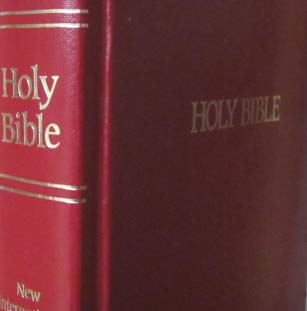
I was asked by multiple atheists – what if some other religious book were true? Here is the response.
In the song “Nada One” Heart’s Nancy Wilson sings about an ephemeral, nocturnal love who has glowing, night creature eyes that frequents her dreams. This mysterious love seems to appear only in dreams where no one can see him. For even when wandering through streets, she describes this scene:
With such descriptions, one questions the reality of his existence. Indeed she herself seems to harbor a doubt or two since she must reminder herself “you are as real as I feel.” The one thing that’s not mysterious in this song, is what she means by “nada one.” Clearly “nada one” is a play on the sound of the phrase “not a one,” yet still, one must wonder – since it is always capitalized – if she’s using it as a proper noun – speaking or referring to a being named “Nada One.” The Wilson sisters were purposefully ambiguous for artistic purposes. But as we’ll see God is purposefully clear and unambiguous to eliminate doubt and nurture faith. I was reminded of this song as I awaited responses to a question I had posed. Let me step back and explain. I saw the below tweet that informed people that last Thursday was “National Ask an Atheist Day.”
This seemed like a perfect opportunity to re-query the unbelieving regarding a question I had asked in a Continue Reading |
Atheists – too afraid to answer
 Some Atheists are too afraid to answer the difficult questions. |
||||
|
There’s a very good article by Peter Saunders titled Twenty questions Atheists struggle to Answer: How Theism does better on the first six. Before presenting the first six issues which atheists struggle to answer (actually he’s being kind – he uses “struggle” as if they have an answer when actually atheism has no reasonable answer to the first 6.), he makes some preliminary comments. The third comment he makes – actually a challenge – is particularly apropos to a recent discussion I had. Speaking to Atheists and agnostics, Saunders says:
Of particular interest is the second sentence, a description of the toxic environment often created by atheists in their so called “discussions” with Christians or theists – discussions which are for the atheist often little more than opportunities to mock. To the list of the usual allegations I would add the allegation of “fallacious argument” a claim atheists wield as a shield against anyone who doesn’t agree with them – apparently before even reading the argument because they use it even when it doesn’t apply. Case in point, my last article – an article which ended with a hypothetical question along the lines of Pascal’s wager: Continue Reading |
Reclaiming the Intellectual and Moral high ground
Don’t fall prey to logical traps, old arguments, or the emotional baiting of evolutionists.
 “It’s over Anakin, I have the high ground.” |
||||
| In my previous post I referenced an article titled “The Top 10 Signs that You Don’t Understand Evolution at All” which is really a restatement of objections that evolutionists believe they have adequately answered, while at the same time lightly(?) mocking creationists – as evolutionists are wont to do. (Whether lightly or not I’ll leave to you.) As is typical in a list like this, the more important questions (for which they have no answer) are not even mentioned much less given adequate answers to. But since I couldn’t bear the thought of leaving you hanging without the answers having myself referenced the article, here are responses to show none of these issues are problems for rational thinking Christians. A word of warning before we begin: Since he couches many of these statements in broad universals (“never,” “always,” etc. – which is a dead give away that the statement is almost certainly untrue and a good candidate for the “all or nothing” logical fallacy); it follows that the position he’s trying to ridicule may be technically untrue, but the point beneath the ridicule that he’s trying to make has been thoroughly refuted as I note below. Below in bold is Tyler Francke’s list of “The top 10 signs that you don’t understand evolution at all” with my explanations following immediately; and so there is no mistake on who’s saying what, my comments are indicated by my initials.
DC>He makes a number of questionable statements here, I’ll just point out a couple. First he notes:
DC>Evolution of the type we’re talking about – molecules to man is not observable. Like many evolutionists he is committing the logical error of equivocation – using the term evolution in more than one sense (which is commonly done to win arguments, though it’s logically fallacious). Natural selection (which is not evolution) is observable; molecules to man evolution is not. Second, he goes on to talk about an inference to the best explanation (which I drew upon in my last article) but intelligent design theorists and creationists alike, (not to mention scientists who dissent from evolutionary theory) would say given the evidence, such as the fossil evidence below, he has not drawn an inference to the best explanation by believing it points to evolution. He states:
DC>I would challenge him that it is not the evidence that points him to evolution, it’s his a priori beliefs (science is authoritative over scripture) that lead him to the conclusion that evolution is true because judging by evidence alone, (such as the evidence from DNA, the young solar system, etc.) the correct conclusion is that there was an intelligent designer. 2. You think we’ve never found a transitional fossil. DC>This is frankly very misleading. A more precise statement would be Continue Reading |
The Best Reason for Apologetics
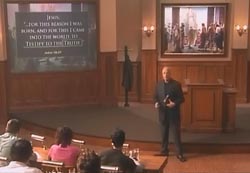
As you might imagine of one hosting a website that deals with apologetic issues, I listened with interest to the debate last Saturday on Moody’s Up For Debate entitled “Do Apologetics Help or Hurt our Christian Witness?” As always the host, Julie Roys welcomed well qualified guests for the discussion: author and professor David Fitch and author and professor Nancy Pearcey. Dr. Fitch offered the concern that apologetics train us in a posture of defensiveness; and that we don’t listen as well, having answers ready before we hear the question. His main objection is summarized in this tweet:
We have a posture of defensiveness which is not needed. Rather we need to embody the story God is telling through us. – #DavidFitch
— Up for Debate Radio (@Up4DebateRadio) March 8, 2014
Professor Pearcey had a number of good responses, in addition to her own testimony of how apologetics helped her come to the faith, some of her reminders include:
– We need to be inclusive in our approaches
– We should use all the tools available to us
– It is possible to do apologetics wrong (implied: therefore learn to do it right!)
– Apologetics can descend into a game of “gotcha”
– And as she reminded us in this tweet:
#Apologetics assists in making ones understanding not simply emotional but intellectually. – #NancyPearcey
— Up for Debate Radio (@Up4DebateRadio) March 8, 2014
But the answer I was expecting, Continue Reading
What is Rational Faith? Part 2
 The 19th century classic “Flatland” by Edwin A. Abbott is an allegory of the resulting social problems and intellectual impasse that results when a person who has been enlightened (and sees a truth beyond what’s normally possible in the physical realm) tries to present that truth to the unenlightened. Flatland is so named because it, and all its inhabitants live in a two dimensional world. When a 3 dimensional object – a being in the shape of a sphere – is introduced to a 2 dimensional Flatlander – a mathematician – the response of humans to revelations (by way of analogy) is on display.
The 19th century classic “Flatland” by Edwin A. Abbott is an allegory of the resulting social problems and intellectual impasse that results when a person who has been enlightened (and sees a truth beyond what’s normally possible in the physical realm) tries to present that truth to the unenlightened. Flatland is so named because it, and all its inhabitants live in a two dimensional world. When a 3 dimensional object – a being in the shape of a sphere – is introduced to a 2 dimensional Flatlander – a mathematician – the response of humans to revelations (by way of analogy) is on display.
As you might expect, the mathematician has the all the concepts and mathematical knowledge to understand the description of a sphere, but while he understands technically what the sphere is saying, since a 3 dimensional object is outside of the realm of the possible within a 2 dimension world, he has a hard time believing what the sphere is saying is true – until the sphere performs miracles – that is to say feats that are miraculous to the two dimensional characters of the story, yet totally understandable to a 3 dimensional person (such as the reader). The main conflict of story centers around the beliefs of most flatlanders: since – as far as they are concerned – 3 dimensional objects are impossible and don’t exist, anyone who claims they are possible (or has seen one) is either insane or dangerous or both, and thus must be placed permanently in a mental institution or must be put to death. Without delving any further into the story, let me point out what Abbott so masterfully illustrates using concepts that we, as 3 dimensional beings, readily understand by his analogy: Continue Reading
What is Rational Faith? Part 1
The Scopes monkey trial, popularized by the decidedly pro-evolution 1960 movie “Inherit the Wind” has been described by one historian as:
“Lasting just 11 days, the trial became a showdown between faith and reason…”1
The charge to be adjudicated: that a teacher by the name of John Scopes had taught Darwin’s theory of Evolution in the classroom, an act which, at the time, was illegal. (My how things have changed.) The goal here is not rehash the trial, or discuss perceived winners and losers. The reason for bringing it up is to point out how it is commonly described: “a showdown between faith and reason.” This “showdown” has been raging at least since that trial, which began July 21, 1925. Some would locate the origin with Galileo’s 17th century dispute with the church over whether the earth went around the sun; or the sun went around the earth.
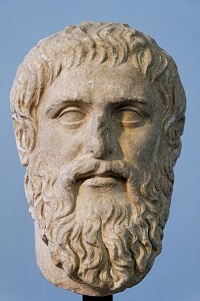
Plato
Some would take it all the way back to the early Greek philosophers Plato and Aristotle who lived a few hundred years before Christ. The point in bringing up the “showdown”: there is a strong, vocal faction aptly represented by the likes of atheist cheerleader Richard Dawkins, who believes that faith and reason are at odds and are irreconcilable.
In a documentary called “Enemies of Reason”, Dawkins states: “There are two ways of looking at the world through faith and superstition, or through the rigors of logic, observation and evidence; through reason. Yet today, reason has a battle on its hands. I want to confront the epidemic of irrational superstitious thinking.”2
Dawkins wants to confront “the epidemic of irrational superstitious thinking.” A noble goal insofar as he correctly identifies that which is superstitious. Problem is he doesn’t. He has a tendency to group that which is true with that which is myth. And so one of my goals is to confront the epidemic of irrational atheistic thinking that winds up getting labeled as “scientific”.
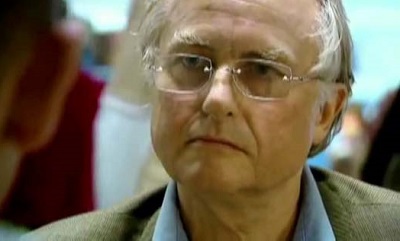
Richard Dawkins
If you think such atheists (and scientists for that matter) are always the objective, logical, followers-of-the-evidence-wherever-it-leads type of people that they like to portray themselves as, you’re in for a rude awaking – as will be evident in posts to come. Some of the other reasons for this site:
- To show that the Christian Faith is rational – using the tools Dawkins specified – logic, observation and evidence.
- And to point out that those claiming that the Christian faith is not rational – are often themselves basing it on incorrect a priori assumptions from their own faith – typically atheism – and not what they claim – logic, observation and evidence.
For those atheists and others who don’t realize that they too are following a faith (that’s a whole other discussion), “rational faith” is a contradiction in terms. As you would expect from someone who is the author of a site titled “Rational Faith” I obviously disagree. But in order to demonstrate that the Christian faith is rational, I’ll need to define exactly what is meant by rational faith. Which I will do, but with this first3 post let me start by defining what rational faith is not. As a point of reference, consider the following definition of “Faith and Rationality” as it appears in Wikipedia as of this writing:
“Faith and rationality are two ideologies that exist in varying degrees of conflict or compatibility.
Rationality is based on reason or evidence.
Faith is belief in inspiration, revelation, or authority. The word faith generally refers to a belief that is held with lack of, in spite of or against reason or evidence. Although the words faith and belief are sometimes erroneously conflated and used as synonyms, faith properly refers to a particular type (or subset) of belief, as defined above.
…
Broadly speaking, there are two categories of views regarding the relationship between faith and rationality:
- Rationalism holds that truth should be determined by reason and factual analysis, rather than faith, dogma, tradition or religious teaching.
- Fideism holds that faith is necessary, and that beliefs may be held without evidence or reason, or even in conflict with evidence and reason”
Clearly this perceived tension between faith and reason is a common and widespread misunderstanding. Many it seems, believe that “faith” and “reasoned, rational thought” are mutually exclusive. That one must “believe” in spite of what reason or evidence tells you. Or as some suggest, when going to church, check your brains at the door. By extension, many believe that faith and science are also at odds – that you can not be a good scientist if you have faith in God; and that true believers in the Christian faith are necessarily antagonistic toward properly applied science. All of these are incorrect and to understand why, we must go back to goal, the point of faith and reason. What is goal of reason? And of Faith? The goal of reason is to identify truth. D. Q. McInerny, author of Being Logical states:
“The whole purpose of reasoning, of logic, is to arrive at the truth of things.”4
What is the goal of faith, speaking specifically of the Christian faith? The Christian faith is all about knowledge of the truth. Jesus says he came to testify about the truth (John 18.37), that he in fact is truth (John 14.6); that the truth will set you free (John 8.32); and that knowledge of the true God, and Jesus (who is truth) leads to eternal life (John 17.3). So in other words, the point of the Christian faith is to identify and know the truth – ultimate truth; and according to Jesus once you properly identify and properly respond to that truth (by believing), God is pleased to grant you eternal life. But don’t be distracted by the promise of eternal life. The point I’m making is that the goal of reason and faith are the same: to arrive at a knowledge of the truth. (And in passing, the goal of science is also to arrive at truth5 – but that’s a discussion for another time.)
If the goal is the same, why is it then, that so many think that faith and reason are at odds? If reason and faith are both striving for the same goal – truth – those following either discipline should arrive at the same destination – at least in the areas to which both disciplines address themselves – such as ultimate truth. And that is precisely my point and my firm belief, and one of the motivating factors behind this blog – to show that both faith and reason, properly understood, guide you to the same place – the true God, creator of the universe, the God of the souls of all mankind.
Thus my main problem with the statement above from Wikipedia and all others who see varying degrees of conflict or incompatibility between faith and reason is that such an understanding mistakenly casts the two as opposites in an either / or proposition. In that light, you either have reason OR you have faith – not both. Atheists like Richard Dawkins try to drive that point home. This blog is to demonstrate that those who think rationally not only have good reason to trust in rational thought, but also have good reason to trust in the Christian Faith – because it is a faith based on evidences and confirmed by reason, and so it is a wholly rational faith (no pun intended).
This leaves us with a lot of questions such as: If Science and Faith have the same goal – truth – why do many see them as being at odds? Are there different types of truth? Do science and faith lead to the same kind of “truth”? If the Christian faith is so rational, why are so many scientists atheists? If Christianity is “rational” and “reasonable”, why does so much of what Christians believe seem to be in conflict with what scientists and the world at large believes? All good questions but too much for one blog post. So we’ll have to return to these issues in the days to come. For now, let me answer the initial question of what rational faith is not with this summary:
- Rational Faith (or faith properly understood) is not in conflict with reason; faith and reason are not contradictory – they are complementary
- Faith and reason are not mutually exclusive
- Faith and reason are not an either / or proposition; they are a both / and proposition; they work together; not against each other
- Faith is not reliant solely on “authority” or “revelation”; it is strongly based in evidences of various types
Now we’ve seen what rational faith is not. Next we’ll see what rational faith is.
Duane Caldwell posted 3-2-2014 | print format | Part 2
Follow @duanecaldwell
Notes
1 10 Days that Unexpectedly Changed America Episode 7: Scopes: The Battle Over America’s Soul TV series Documentary, 2006
back
2 Dawkins, Richard Enemies of Reason Documentary, 2007
back
3 First written at any rate, though I wound up electing to post select pieces of evidences ahead of this post so they would be available for my atheists acquaintances on their first visit
back
4 McInerny, D.Q. Being Logical, A Guide to Good Thinking New York: Random House 2005, p. 19
back
5 That science is ultimately concerned with truth is a point rarely discussed, but is acknowledged when necessary, as in this response from a writer for Scientific America who states:
“Let’s understand one thing loud and clear; science is concerned with the truth. It really is.”
Ashutosh Jogalekar “Creationists are wrong. Science is actually concerned with the truth” 7/19/13 “The Curious Wavefunction” blog on Scientific American
The Institute for Creation Research (ICR) takes it a step further stating the point of science is to measure theories against absolute truth; implying the goal is to discover elements of truth that are not known.ICR “The Foundation of Science Is Absolute Truth” accessed 1/28/14
